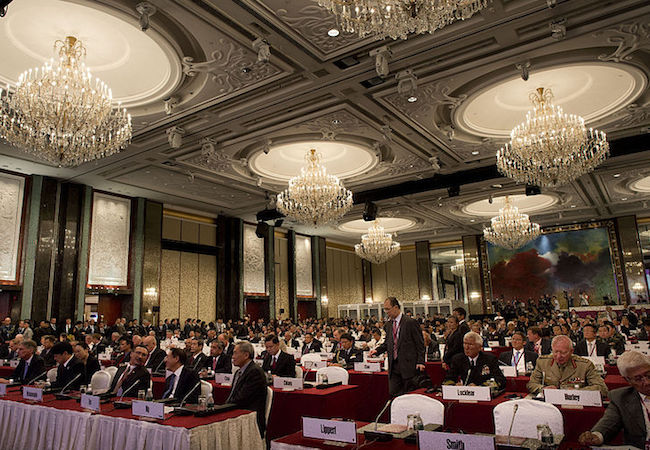
By Shantanu Roy-Chaudhury
The Shangri-La Dialogue was originally known as The Asia Security Summit. It is a Track One inter-governmental security forum held by the International Institute for Strategic Studies. The dialogue is held at the Shangri-La hotel in Singapore from where it gets its name. It was initiated in 2002 in response to the clear need for a forum where the Asia-Pacific’s defence ministers could engage in dialogue aimed at building confidence and fostering practical security cooperation.[1]
This year’s Shangri-La Dialogue which took place from the 3rd – 5th of June 2016, was dominated by the territorial dispute over the South China Sea. Since the last dialogue, China has stepped up its maritime patrols across the waterway and built up a series of military bases on small islands it reclaimed from the ocean. It has also repeatedly said it will not recognise the ruling of the UN arbitration court on its dispute with the Philippines.[2] During the forum, defence ministers from the U.S., Britain, France, Canada, and India asked China to respect the international law and uphold the freedom of navigation in the South China Sea. This was in response to China laying claim to more than 80 percent of the South China Sea, which is a crucial shipping route where more than $5 trillion in trade passes through every year.[3]
U.S. Defence Secretary Ash Carter stated that China risked erecting a “Great Wall of self-isolation” through its actions in the South China Sea. The Defence Secretary also increased American pressure by warning China of consequences for its actions. China rejected these accusations, and Admiral Sun Jianguo, the deputy chief of the Joint Staff Department of China’s Central Military Commission and head of the Chinese delegation replied to this comment by stating that he was worried that some people and countries still look at China with the Cold War mentality and prejudice.[4] The U.S. Defences Secretary also urged the Chinese to respect the outcome of the UN arbitration case. This case, which was filed by the Philippines in 2014, was a bid to curtail China’s territorial claims in the South China Sea.
During the dialogue, the Chinese delegation also handed out leaflets where China falsely claimed sovereignty over all islands in the East Vietnam Sea. The leaflets included wrong statements that the disputes in the East Vietnam Sea were ignited by many nations that had “invaded” Chinese islands.[5]
Even though this year’s dialogue was heavily dominated by issues in the South China Sea, the Chinese delegation and Admiral Sun seemed confident about their activities and rebuffed American pressure to curb its activities in the area. The deputy head of the Chinese delegation stated that the United States should also reduce its provocative exercises and patrols in the region.[6] The confidence exerted by the Chinese took form in Admiral Sun’s statements where he stated that they have no fear of trouble, and will not be bullied. He also added that “China will not bear the consequences, nor will it allow any infringement on its sovereignty and security interest, or stay indifferent to some countries creating chaos in the South China Sea,”[7] showing just how adamant the Chinese are about their position in the area.
References
- About Shangri-La, IISS Shangri-La Dialogue, https://www.iiss.org/en/events/shangri-s-la-s-dialogue/about-shangri-la
- Lee Seok Hwai – 5 Highlights of Shangri-La Dialogue 2016, The Straits Times, 6th June 2016, http://www.straitstimes.com/asia/se-asia/5-highlights-of-shangri-la-dialogue-2016
- Philip Wen – China, US offer competing visions of Asian security at Shangri-La Dialogue, The Sydney Morning Herald, 5th June 2016, http://www.smh.com.au/world/china-us-offer-competing-visions-of-asian-security-at-shangrila-dialogue-20160605-gpc19u.html
- Ibid
- China fools nobody but itself at Shangri-La Dialogue, Tuoi Tre News, 5th June 2016, http://tuoitrenews.vn/politics/35197/china-fools-nobody-but-itself-at-shangrila-dialogue
- David Brunnstromm and Greg Torode – U.S. flexes muscles as Asia worries about South China Sea Row, Reuters, 4th June 2016, http://www.reuters.com/article/us-asia-security-idUSKCN0YQ01N
- Ibid.




